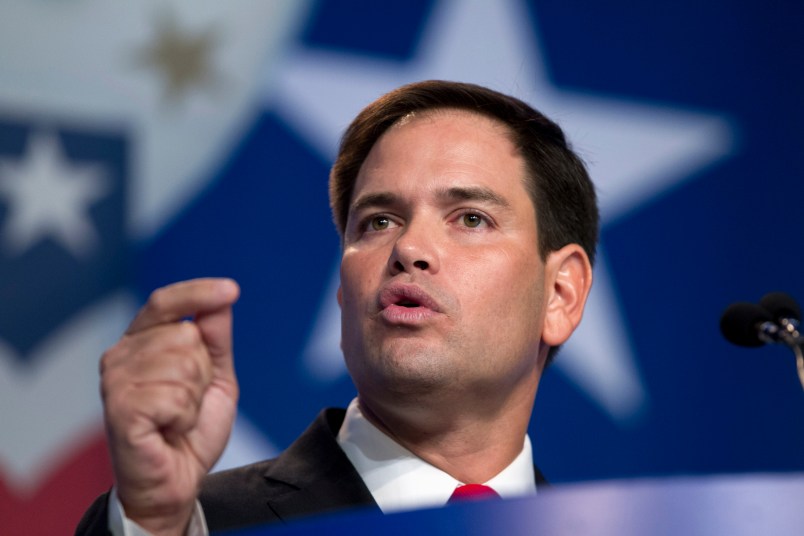The most prominent conservative supporter of sweeping immigration reform is calling on Congress to dial back the effort and instead focus on making incremental changes, delivering a significant blow to the prospects of reform.
Sen. Marco Rubio (R-FL) now opposes a bicameral conference committee to reach a final resolution to the Senate-passed bill, his spokesman said, arguing that the support is not there for a comprehensive overhaul and that Congress should act where there is consensus.
“The point is that at this time, the only approach that has a realistic chance of success is to focus on those aspects of reform on which there is consensus through a series of individual bills,” Alex Conant, a top spokesman for Rubio, told TPM in an email. “Otherwise, this latest effort to make progress on immigration will meet the same fate as previous efforts: failure.”
Rubio previously had not addressed the issue of conference on the Senate bill. But the senator’s stance against it now is an ominous sign for reform because anxious pro-reform advocates believe it is the only feasible way to salvage a sweeping overhaul. There is no bipartisan consensus on immigration reform without a path to citizenship for the 11 million people living in the country illegally. The House Republican majority opposes such a provision. Proponents had hoped the House would approve smaller, piecemeal bills and move to initiate a conference committee to reconcile the chambers’ differences — the normal legislative process. Conservatives quickly saw the strategy as a ploy to enact “amnesty” and moved to close the door on conference.
Now, they have Rubio’s support.
“[E]arlier this year, Senator Rubio put aside his personal preference for a piecemeal approach and reached across the aisle to craft a bipartisan solution in the Senate. And unlike many of the proponents of reform in the Democratic party, he did so despite strong opposition within his own party and at a significant and well documented political price,” Conant said. “But sufficient support for that approach simply does not exist at this time. And in fact it has only eroded further as evidenced by the fact that virtually every House Republican working on a bipartisan comprehensive bill has since abandoned that effort.”
The ambitious Florida senator saw his standing diminish among conservative voters after he supported the Senate bill. Opposing conference on the Senate bill leaves little, if any, room to pass reform through a divided Congress as the broad coalitions that hold together the Senate legislation would splinter if any major components are excluded. House Republicans have resisted President Barack Obama’s repeated calls for reviving the stalled effort, and lack an internal consensus on how to proceed on an incremental basis.
Conant confirmed a report over the weekend in Breitbart, a conservative website, in which he telegraphed the senator’s concerns with passing piecemeal bills in the House as a “ruse to trigger a conference” with the Senate.
“We should not allow an inability to do everything to keep us from doing something,” Conant told TPM. “At this time, the only approach that has a realistic chance of success is to focus on those aspects of reform on which there is consensus through a series of individual bills.”






